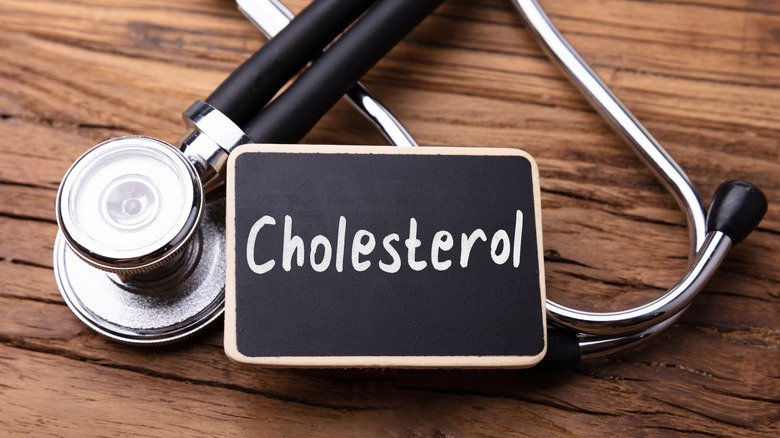What Is Cholesterol And Where Does It Come From?
While cholesterol often gets a bad rep, your body actually needs it to function properly. Cholesterol is a waxy, fat-like substance that your body uses to build cells and make vitamins and hormones (via the American Heart Association). Your liver produces all the cholesterol you need, but it is also present in some foods like meat, poultry, and dairy products. Cholesterol becomes a problem and is considered "bad" when you have too much of it.
Cholesterol circulates in the blood and as the amount increases, so does the risk of health problems like heart disease and stroke. Eating animal products, which are high in saturated and trans fats, leads to an increased production of cholesterol in the liver. This added production could lead a person's cholesterol levels to go from normal to an unhealthy level. There are two types of cholesterol: LDL, which is the "bad" kind, and HDL, which is considered "good." Having too much LDL or not enough HDL increases the risk of cholesterol building up and blocking your arteries. This is a major risk factor for a heart attack or stroke.
How to lower your cholesterol
High cholesterol usually has no signs or symptoms, so it is important to get your levels checked (via Centers for Disease Control and Prevention). For healthy adults, the CDC advises getting your cholesterol checked every 4 to 6 years. People who have heart disease or have a family history of high cholesterol will need to get it checked more often.
If you have high cholesterol, there are several steps you can take to help get it under control. Lifestyle changes are typically the first line of treatment, according to Johns Hopkins Medicine. Eating a heart-healthy diet, limiting saturated and trans fats found in animal products and fried and baked foods, is a good first step. Getting in at least 30 minutes of physical activity each day is also important. If you are overweight or obese, losing weight can help lower cholesterol. In addition to lifestyle changes, your doctor may also prescribe cholesterol-lowering medications such as statins. Your doctor will help you decide what course of treatment is best for you.


